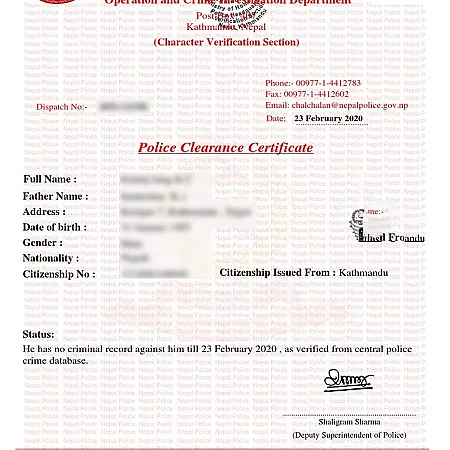Procedural of Foreign Direct investment in Nepal
Introduction
A countries economy depends upon the investment done by private and government entities, but investment from a party from other countries businesses and corporations are also important part of domestic and international economy. These types of investment are known as foreign direct investment (FDI). Nepal started planned programs of economic development as early as mid-fifties with the launching of first five-year plan in 1956. 9five year plan and 3 three-year plan heaves already been implemented. Therefore, FDI plays a vital role in Economic development and poverty eradication in Nepal.
Leal framework guiding FDI in Nepal
The major law that guides FDI in Nepal are the:
- Foreign Investment and technology transfer act 2019
- Industrial enterprises act, 2020
- Foreign Investment and technology transfer rules, 2020
- Foreign exchange regulation 2019
- Public private partnership and investment act, 2019
According to the FITTA act 1192 “Foreign investment means following made by a foreign investor in any industry:
- Investment in share (Equity)
- Reinvestment of the earning derived from shares and equity.
- Investment made in the form of loans or loan facilities.

Minimum capital threshold for FDI in Nepal
The Investment board of Nepal has made a minimum threshold of 20 million Nepali rupees that is in approx. 142,739.10 dollar.
Administrative bodies for FDI in Nepal
|
Name of the Administrative bodies |
Task List on FDI |
|
Approval of FDI less than Rs 6 billion. |
|
Approval of FDI and hydropower project more than 200 MW |
|
|
Approval of FDI in case of share purchase of more than 6 billion. |
|
|
Registers the company either PVT.LTD, PBT/LTD |
|
|
Grant PAN/VAT registration number for taxation. |
Industries not to be granted permission for Foreign Investment
Industries not to be granted FDI in Nepal are shown below with legal provisions:
- Industries Not Permitted for Foreign Investment:
- Cottage Industries: These industries are listed in Annex-21 and are not open to foreign investment.
- Personal Service Businesses: This category includes businesses such as hair cutting, beauty parlors, tailoring, and driving training, which are not eligible for foreign investment.
- Arms and Ammunition Industries: The production and trade of weapons and related equipment are restricted from foreign investment.
- Gunpowder and Explosives: Manufacturing and handling of explosive materials are not permitted for foreign investors.
- Industries Related to Radio-Active Materials: Activities involving the handling, processing, or production of radioactive substances are prohibited for foreign investment.
- Real Estate Business: Foreign investment is not allowed in real estate, excluding construction industries.
- Film Industries: Film production in national languages and other recognized languages of the nation is restricted from foreign investment.
- Security Printing: Printing of secure documents such as passports and certificates is not open to foreign investment.
- Bank Notes and Coins: The production of currency and coins is restricted from foreign investment.
- Retail Business: Foreign investment is not allowed in retail businesses, except for international chain retail businesses operating in at least two countries.
- Bidi: Foreign investment is prohibited in bidi production, except for businesses with more than 90% exportable production.
- Internal Courier Service: Domestic courier and delivery services are not open to foreign investment.
- Atomic Energy: Activities related to atomic energy production and research are restricted from foreign investment.
- Poultry: Poultry farming and related activities are not permitted for foreign investment.
- Fisheries: Fish farming and related activities are restricted from foreign investment.
- Bee Keeping: Honey production and related activities are not open to foreign investment.
- Consultancy Services: This includes management, accounting, engineering, and legal services, with a maximum of 51% foreign investment allowed.
- Beauty Parlor: Beauty and grooming services are not permitted for foreign investment.
- Processing of Food Grains on Rent: Rented facilities for processing food grains are restricted from foreign investment.
- Local Catering Services: Local catering businesses are not open to foreign investment.
- Rural Tourism: Tourism activities in rural areas are restricted from foreign investment.
- Key Provisions and Policies:
- Technology Transfer: Technology transfer is allowed even in sectors where foreign investment is prohibited.
- No Nationalization: The Industrial Enterprises Act (IEA) 1992 guarantees against the nationalization of privately owned industries.
- Decontrol of Prices: The government does not interfere in the pricing of industrial products.
- Simplification in Import of Machinery and Raw Materials: Industries can directly approach commercial banks to open Letters of Credit for importing machinery or raw materials. No recommendation or import license from the Department of Industries, Department of Commerce, or Nepal Rastra Bank is required.
- Minimum Approval Procedures: Except for industries affecting security and public health, no license or permission is required for establishment and operation. Registration with the concerned Department is sufficient. Industries requiring licenses include:
- Explosives, Arms, Ammunition, and Gunpowder.
- Security Printing, Bank Notes, and Mint industries.
- Cigarettes, Bidi, Cigar, Chewing Tobacco, Khaini, and similar tobacco-based products.
- Alcohol or beer-producing industries.
- Time-Bound Decision Process: Decisions on industrial licenses, registration, and duty drawbacks are made within:
- 30 days for industrial licenses.
- 21 days for registration.
- 60 days for duty drawbacks.
- Transparency and Clarity of Facilities: The Act clearly outlines facilities and incentives for various industries to avoid ambiguity.
- Repatriation of Profits and Fees: Repatriation of profits, dividends, technical and managerial fees, and a portion of foreign experts' salaries is guaranteed. Corporate income tax for manufacturing units is fixed at 20%, one of the lowest in the region.
- Visa Provisions: Non-tourist visas for investment studies and business/residential visas for foreign investors are available, with simplified procedures.
- International Commitments:
- Nepal is a member of:
- World Intellectual Property Organization (WIPO).
- Multilateral Investment Guarantee Agency (MIGA).
- World Trade Organization (WTO), SAFTA, and BIMSTEC.
- Nepal is a signatory to:
- Convention on the Settlement of Investment Disputes between States and Nationals of Other States.
- Member of the International Centre for the Settlement of Investment Disputes (ICSID), associated with the World Bank.
- Bilateral Investment Treaties (BITs) signed with:
- France, Germany, Mauritius, Finland, United Kingdom, and India.
- Double Taxation Treaties (DTTs) signed with:
- India, Norway, China, Pakistan, Sri Lanka, Austria, Thailand, Mauritius, Republic of South Korea, and Qatar.
- Nepal is a member of:
FDI approval Procedural in Nepal
FDI approval from DOI
Any foreign individual, firm, or company intending to engage in one or a combination of the following activities must obtain prior approval from the Department of Industries (DOI). The relevant sections handling these approvals are the Foreign Investment Section and the License/Registration Section. The activities requiring approval include:
- Establishing a New Industry: This includes setting up a new industry either with 100% foreign equity or through a Joint Venture (JV) with Nepalese or foreign investors.
- Technology Transfer: Engaging in technology transfer within an existing industry requires prior approval.
- Equity Investment via Share Transfer: Making an equity investment in an existing industry through the transfer of shares must be approved.
- Loan Investment: Providing a loan investment, whether foreign or local, to an existing industry also requires prior approval.
The procedures for obtaining approvals for each of these forms of foreign investment are detailed in subsequent sub-sections, ensuring a structured and transparent process for foreign investors.
Incorporation of Company in the OCR
After receiving approval for foreign investment for equity participation from the Department of Industries (DOI), as outlined in Section 2.1.1, investors are required to submit the following documents online to the Office of the Company Registrar (OCR) through its official website, www.ocr.gov.np. These documents must be accompanied by a copy of the receipt for the registration fee, as specified in Appendix 9. The required documents include:
- Copy of the Permission for Foreign Investment: A copy of the approval issued by the DOI for foreign investment.
- Copy of Citizenship Certificate: A copy of the citizenship certificate of the Nepalese promoters involved in the investment.
- Copy of Passport: A copy of the passport of the foreign promoter(s).
- Board of Directors' Resolution (if applicable): If the foreign party is a company, a copy of the minutes of the Board of Directors' meeting approving the investment.
- Articles and Memorandum of Association: Two copies of the company's proposed Articles and Memorandum of Association, drafted in the Nepalese language.
An overview of the possible contents of the Memorandum and Articles of Association is provided in Appendix-9. This online submission process ensures a streamlined and efficient registration process for foreign investors.
Tax and Pan registration at the Inland Revenue office
Any business entity, including industries, that is required to pay income tax or Value Added Tax (VAT) must obtain a Permanent Account Number (PAN). While registering a company at the Office of the Company Registrar (OCR), the newly formed company receives a temporary PAN registration number. However, to obtain a permanent PAN/VAT registration number, the industry must register with the District Office of the Inland Revenue Department or Inland Revenue Office (IRO). There is no fee or deposit required for PAN registration.
PAN registration is essential for various activities, including buying land, constructing buildings, and clearing goods at customs. Therefore, it is recommended that companies register with the IRO immediately after incorporation. To apply for PAN registration, the company must submit an application form as specified in the Income Tax Act and Rules, along with the following documents:
- Copy of the Certificate of Incorporation.
- Copy of the Memorandum and Articles of Association.
- Copy of the Citizenship Certificate (or passport in the case of a foreign national) of the individual signing the application.
- Two Passport-Sized Photos of the individual signing the application.
- Hand-Drawn Sketch of the business location of the applicant.
- Power of Attorney, if applicable.
Additionally, the company is required to submit its balance sheet and profit and loss statement at the end of each fiscal year for income tax assessment. This process ensures compliance with tax regulations and facilitates smooth business operations.
Registration of Industry at the DOI
After securing approval for foreign investment, the industry must be registered with the Department of Industries (DOI) within 35 days. If registration cannot be completed within this period, the investor must apply for an extension of the validity period. Once the company is incorporated, the investor is required to apply for industry registration at the DOI by submitting a prescribed form (provided in Appendix-10) along with the following documents:
- Copy of Foreign Investment Approval Letter: A copy of the approval letter issued by the Foreign Investment Section of the DOI.
- Company Incorporation Documents: Copies of the Certificate of Incorporation, Memorandum of Association, and Articles of Association of the company.
- Environmental Compliance Reports: Either an Environmental Impact Assessment (EIA) Report or an Initial Environmental Examination (IEE) Report, depending on the industry category.
This process ensures compliance with regulatory and environmental standards while facilitating the timely registration of foreign-invested industries.
Grant of non-blacklist certification from the credit information Bureau
The Grant of Non-Blacklist Certification from the Credit Information Bureau (CIB) is an official document that certifies an individual or business is not listed on any credit blacklist. Issued by CIB or a similar financial authority, this certification is often required for financial and business activities such as applying for loans, securing credit facilities, or participating in government tenders. It serves as proof that the applicant has no history of defaults, unpaid debts, or financial misconduct that could result in blacklisting. This assurance helps financial institutions, government agencies, and business partners confirm that the applicant has a clean credit history and is financially credible.
To obtain the certification, the applicant must apply to the CIB, which verifies their credit history and financial records. If no negative records are found, the bureau issues the non-blacklist certification, which is typically valid for a specific period, such as six months or one year, after which it must be renewed if required. The certification is often a mandatory document for accessing credit and participating in government contracts, helping build trust with lenders and investors. Applicants must provide an application form, identification documents, company registration documents (if applicable), and pay the prescribed fee to receive the certification.
Obtaining approval from the NRB to infuse the investment amount
Obtaining Approval from the Nepal Rastra Bank (NRB) for FDI Investment Infusion refers to the process of securing permission from the central bank to inject foreign direct investment (FDI) into Nepal. This approval is mandatory for foreign investors to ensure compliance with Nepal’s financial regulations and to monitor the inflow of foreign currency into the country.
The process involves submitting an application to the NRB along with necessary documents, such as the company’s registration certificate, investment agreement, projected financial details, and proof of the source of funds. The NRB reviews the application to confirm that the investment adheres to legal and financial guidelines, including sector restrictions and anti-money laundering policies. Once approved, the investor is authorized to bring the investment amount into Nepal, enabling the business to proceed with its operations legally.
Infusion of investment amount in local bank and obtaining investment certificate
The Infusion of Investment Amount in a Local Bank and Obtaining an Investment Certificate involves depositing the approved foreign investment amount into a designated local bank account in Nepal. Once the funds are transferred, the bank issues an investment certificate, which serves as official proof of the inflow of foreign direct investment (FDI) and is essential for future regulatory compliance and business operations.

Recording of the infused investment amount at the NRB
Recording of the Infused Investment Amount at the NRB is the process of officially registering the deposited foreign investment with Nepal Rastra Bank (NRB). The local bank notifies NRB of the investment inflow, and the investor submits required documents for verification. Once recorded, NRB updates its records, confirming the legitimacy of the investment for regulatory purposes.
Documentation requirement of FDI proposal in Nepal
- Project Report detailing the project’s background, market analysis, technical and financial aspects, and investment details.
- Bio-data or Company Profile of the foreign investor.
- Registration Documents of the foreign investor, including the Certificate of Registration, Memorandum of Association, and Articles of Association.
- Corporate Resolution authorizing the foreign investor to invest in Nepal.
- Financial Credibility Certificate from a bank in the investor’s home country, confirming financial reliability.
- Source of Investment Statement and Investment Timeline outlining the origin of funds and proposed investment schedule.
- Power of Attorney authorizing a representative to complete the approval and registration process on behalf of the foreign investor.
- Passport Copies of the foreign investor (if an individual) or the directors (if an entity).
- Investor Commitment Letter declaring that the foreign investor will not repatriate the investment within one year.
- Joint Venture Agreement, unless the local company is a wholly-owned subsidiary or the investor is an individual.
Conclusion
The FDI approval process in Nepal can take are around 1to 2 months, currently many law firms have been actively giving services for FDI approval in Nepal and take certain fees. For further quarries you can email us for legal consultation on FDI and business opportunities in Nepal.







-thumb.webp)

-thumb.webp)
